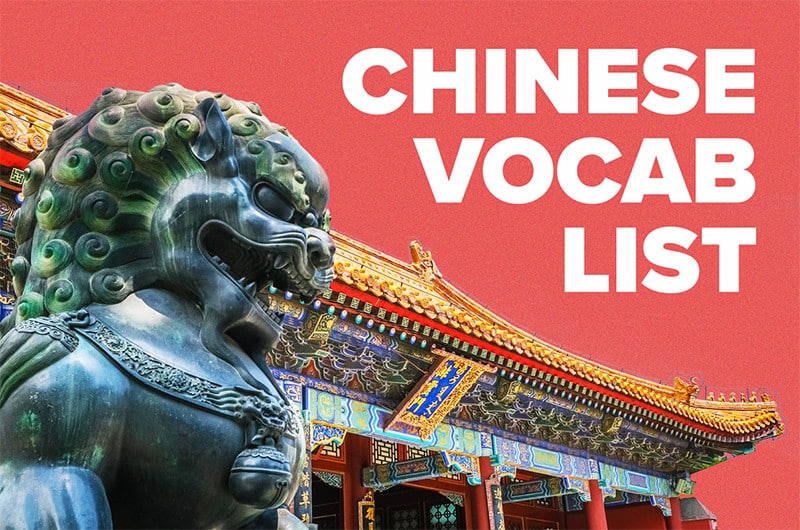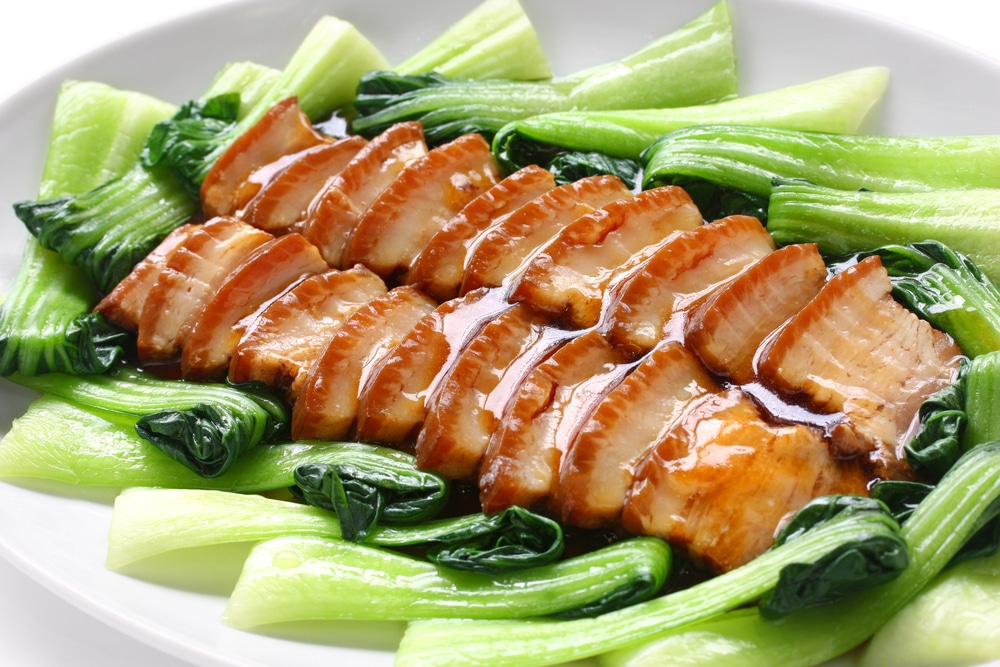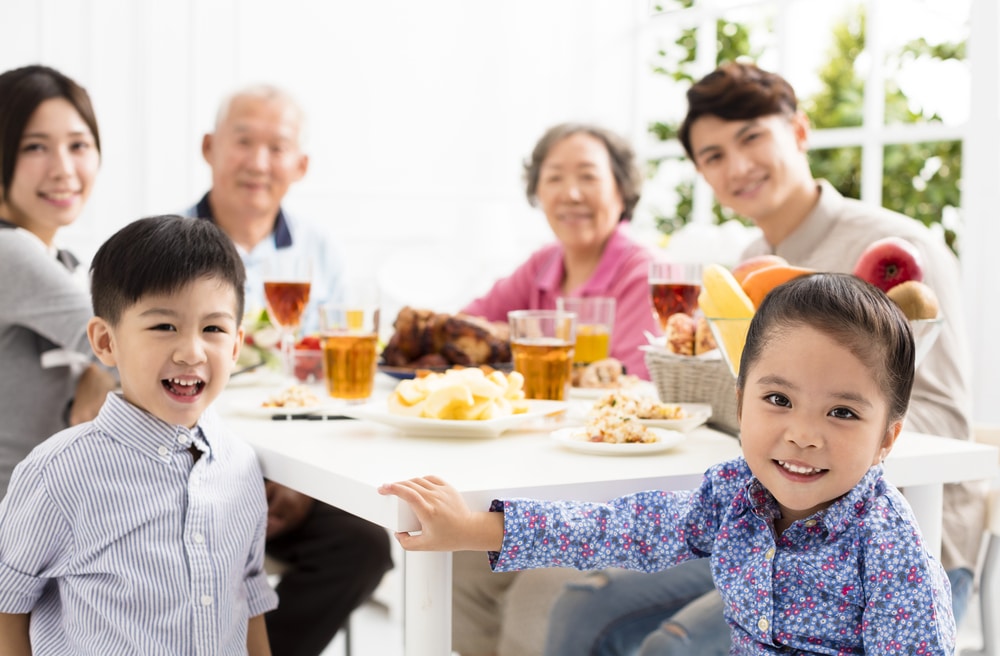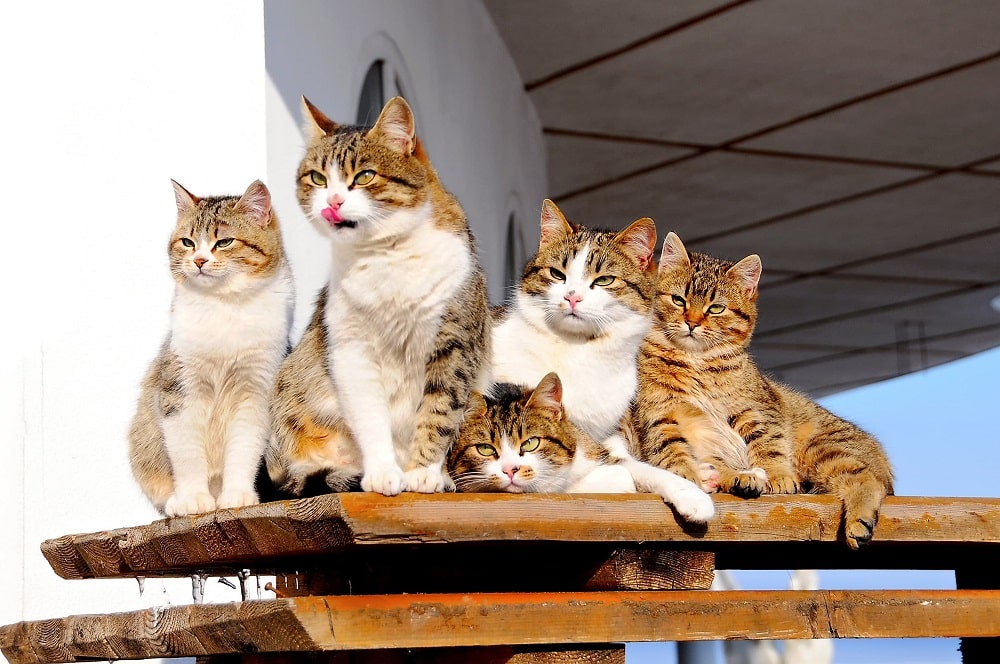200+ Essential Chinese Words and Phrases [with Audio and Free PDF]

Focus on the most common Chinese words, and you’ll be able to get a solid foundation in the language.
You’ll also navigate conversations faster and get better at handling different situations.
This post will take you through 212 of the most common Chinese vocabulary words, plus links to helpful posts with additional terms and information.
Contents
Download: This blog post is available as a convenient and portable PDF that you can take anywhere. Click here to get a copy. (Download)
Common Phrases

These are the words and phrases you’d need most in a Chinese-speaking region:
| Chinese | Pinyin | English |
|---|---|---|
| 你好 | nǐ hǎo | Hello |
| 你叫什么名字? | nǐ jiào shén me míng zì? | What's your name? |
| 谢谢 | xiè xie | Thank you |
| 不好意思 | bù hǎo yì si | Excuse me |
| 对不起 | duì bù qǐ | I'm sorry |
| 我听不懂 | wǒ tīng bù dǒng | I don't understand |
| 不是 / 没有 | bú shì / méi yǒu | No* |
| 厕所在哪里? | cè suǒ zài nǎ lǐ? | Where's the bathroom? |
| 你吃了吗? | nǐ chī le ma? | How are you? [lit. Have you eaten?] |
| 再见 | zài jiàn | Goodbye |
*The Mandarin word for “no” depends on context; you can learn more here.
You can also learn:
- more everyday phrases
- how to ask for directions
- polite ways to say thank you
- more phrases to say sorry
- ways to say excuse me
- helpful phrases for travel
Food & Drinks

China is a place well known for its cuisine. Here are the most common words for basic foods in Chinese:
| Chinese | Pinyin | English |
|---|---|---|
| 食物 | shí wù | Food |
| 早饭 | zǎo fàn | Breakfast |
| 午饭 | wǔ fàn | Lunch |
| 晚饭 | wǎn fàn | Dinner |
| 鸡肉 | jī ròu | Chicken |
| 猪肉 | zhū ròu | Pork |
| 牛肉 | niú ròu | Beef |
| 海鲜 | hǎi xiān | Seafood |
| 蛋 | dàn | Egg |
| 蔬菜 | shū cài | Vegetables |
| 水果 | shuǐ guǒ | Fruit |
| 饭 | fàn | Rice |
| 面 | miàn | Noodles |
| 汤 | tāng | Soup |
See this post for more specific food vocabulary, and this post for vegetables and vegetable dishes. You can also learn how to order food in Chinese and discover useful restaurant phrases.
What’s a meal without a beverage? Below are common drinks and related terms in Mandarin:
| Chinese | Pinyin | English |
|---|---|---|
| 饮料 | yǐn liào | Drinks |
| 水 | shuǐ | Water |
| 汽水 | qì shuǐ | Sparkling water |
| 葡萄酒 | pú táo jiǔ | Wine |
| 啤酒 | pí jiǔ | Beer |
| 苏打 | sū dǎ | Soda |
| 汁 | zhī | Juice |
| 牛奶 | niú nǎi | Milk |
| 豆浆 | dòu jiāng | Soy milk |
| 茶 | chá | Tea |
| 咖啡 | kā fēi | Coffee |
| 拿铁咖啡 | ná tiě kā fēi | Latte |
| 热 | rè | Hot |
| 冷 | lěng | Cold |
| 冰 | bīng | Ice |
| 糖 | táng | Sugar |
Here’s a full list of drinks in Chinese, as well as how to order coffee and all about alcohol.
Clothes & Shopping

If you’re spending time in China, you may be interested in checking out the fashion. Here are some helpful terms:
| Chinese | Pinyin | English |
|---|---|---|
| 衣服 | yī fú | Clothes |
| 衬衫 | chèn shān | Shirt |
| 裤子 | kù zi | Pants |
| 牛仔裤 | niú zǎi kù | Jeans |
| 短裤 | duǎn kù | Shorts |
| 裙子 | qún zi | Skirt |
| 连衣裙 | lián yī qún | Dress |
| 外套 | wài tào | Coat |
| 袜子 | wà zi | Socks |
| 鞋 | xié | Shoes |
Here’s our complete guide to clothing in Chinese.
And if you’re looking to purchase clothes or other items, these terms will help you out:
| Chinese | Pinyin | English |
|---|---|---|
| 商店 | shāng diàn | Store |
| 百货公司 | bǎi huò gōng sī | Mall |
| 买 | mǎi | To buy |
| 礼物 | lǐ wù | Gift |
| 这个多少钱? | zhè ge duō shǎo qián? | How much does this cost? |
| 我可以试穿吗? | wǒ kě yǐ shì chuān ma? | Can I try it on? |
| 元 / 块 | yuán / kuài | Monetary unit |
| 现金 | xiàn jīn | Cash |
| 零钱 | líng qián | Small change |
| 信用卡 | xìn yòng kǎ | Credit card |
You can also check out more useful phrases for shopping and learn more about money in Chinese.
Colors

Knowing colors in Mandarin can help you discuss clothes, food, drinks and so much more.
| Chinese | Pinyin | English |
|---|---|---|
| 颜色 | yán sè | Color |
| 黑色 | hēi sè | Black |
| 白色 | bái sè | White |
| 灰色 | hūi sè | Gray |
| 棕色 | zōng sè | Brown |
| 红色 | hóng sè | Red |
| 橙色 | chéng sè | Orange |
| 黄色 | huáng sè | Yellow |
| 绿色 | lǜ sè | Green |
| 蓝色 | lán sè | Blue |
| 紫色 | zǐ sè | Purple |
| 粉红色 | fěn hóng sè | Pink |
Check out our full list of colors in Chinese here.
Numbers

Learning how to count is a vital skill in any language. Here’s zero through ten, plus a few other helpful numbers:
| Chinese | Pinyin | Number |
|---|---|---|
| 零 | líng | 0 |
| 一 | yī | 1 |
| 二 | èr | 2* |
| 三 | sān | 3 |
| 四 | sì | 4 |
| 五 | wǔ | 5 |
| 六 | liù | 6 |
| 七 | qī | 7 |
| 八 | bā | 8 |
| 九 | jiǔ | 9 |
| 十 | shí | 10 |
| 十五 | shí wǔ | 15 |
| 一百 | yī bǎi | 100 |
| 一千 | yī qiān | 1,000 |
*There are two ways to say “two” in Chinese; learn more in our complete number guide.
You can also learn how to tell time and how to do basic math in Chinese.
Days & Months

You’ll also want to know how to discuss dates in Chinese, especially if you’re traveling.
| Chinese | Pinyin | English |
|---|---|---|
| 星期一 | xīng qī yī | Monday |
| 星期二 | xīng qī èr | Tuesday |
| 星期三 | xīng qī sān | Wednesday |
| 星期四 | xīng qī sì | Thursday |
| 星期五 | xīng qī wǔ | Friday |
| 星期六 | xīng qī liù | Saturday |
| 星期日 / 星期天 | xīng qī rì / xīng qī tiān | Sunday |
| 今天 | jīn tiān | Today |
| 明天 | míng tiān | Tomorrow |
| 昨天 | zuó tiān | Yesterday |
See this post for more about the days of the week in Mandarin.
And here are the months:
| Chinese | Pinyin | English |
|---|---|---|
| 一月 | yī yuè | January |
| 二月 | èr yuè | February |
| 三月 | sān yuè | March |
| 四月 | sì yuè | April |
| 五月 | wǔ yuè | May |
| 六月 | liù yuè | June |
| 七月 | qī yuè | July |
| 八月 | bā yuè | August |
| 九月 | jiǔ yuè | September |
| 十月 | shí yuè | October |
| 十一月 | shí yī yuè | November |
| 十二月 | shí èr yuè | December |
| 月 | yuè | Month |
| 年 | nián | Year |
You can also check out our full post on the months in Chinese (plus the lunar calendar).
Seasons, Weather & Holidays

Discussing the weather is also considered small talk in Mandarin! Here’s important vocabulary for doing just that:
| Chinese | Pinyin | English |
|---|---|---|
| 季节 | jì jié | Season |
| 夏天 | xià tiān | Summer |
| 秋天 | qiū tiān | Fall |
| 冬天 | dōng tiān | Winter |
| 春天 | chūn tiān | Spring |
| 天气 | tiān qì | Weather |
| 热 | rè | Hot |
| 冷 | lěng | Cold |
| 凉快 | liáng kuai | Pleasant |
| 晴朗 | qíng lǎng | Sunny |
| 多云 | duō yún | Cloudy |
| 雨 | yǔ | Rainy |
| 风 | fēng | Windy |
| 雪 | xuě | Snowy |
Follow these links for our full posts about the seasons and the weather.
Additionally, many Chinese holidays relate to the time of year. These are some of the most popular holidays in China:
| Chinese | Pinyin | English |
|---|---|---|
| 节日 | jié rì | Festival / Holiday |
| 新年 | xīn nián | New Year |
| 春节 | chūn jié | Spring Festival |
| 端五节 | duān wǔ jié | Dragon Boat Festival |
| 中秋节 | zhōng qiū jié | Mid-Autumn Festival |
| 万圣节 | wàn shèng jié | Halloween |
| 圣诞节 | shèng dàn jié | Christmas |
| 新年快乐! | xīn nián kuài lè! | Happy New Year!* |
*You can sub another holiday in place of “New Year.”
Learn more about the holidays and related phrases by checking out these posts on:
Family, Friends & Relationships

To talk about your family, friends, romantic partner, classmates or colleagues, you’ll need these vocabulary terms:
| Chinese | Pinyin | English |
|---|---|---|
| 家人 | jiā rén | Family |
| 妈妈 | mā mā | Mom |
| 爸爸 | bà ba | Dad |
| 兄弟姐妹 | xiōng dì jiě mèi | Siblings |
| 妻子 | qī zi | Wife |
| 丈夫 | zhàng fū | Husband |
| 孩子 | hái zi | Child |
| 祖父母 | zǔ fù mǔ | Grandparents |
| 亲戚 | qīn qī | Relative |
| 朋友 | péng yǒu | Friend |
| 女朋友 | nǚ péng yǒu | Girlfriend |
| 男朋友 | nán péng yǒu | Boyfriend |
| 同学 | tóng xué | Classmate |
| 同事 | tóng shì | Colleague |
Check out these links for how to introduce your family and friends and useful phrases for hanging out.
You can also discover Mandarin phrases for “good luck” and “congratulations” to say to these important people in your life.
Feelings

It’s important to be able to express yourself in the language you’re using, even at a basic level. Here’s what to say in Chinese:
| Chinese | Pinyin | English |
|---|---|---|
| 感觉 | gǎn jué | Feelings |
| 觉得 | jué de | To feel |
| 高兴 | gāo xìng | Happy |
| 兴奋 | xīng fèn | Excited |
| 满足 | mǎn zú | Content |
| 伤心 | shāng xīn | Sad |
| 生气 | shēng qì | Angry |
| 害怕 | hài pà | Afraid |
| 紧张 | jǐn zhāng | Nervous |
| 累死 | lèi sǐ | Tired |
For more emotions in Mandarin, see this post.
You may also be interested in how to say “I love you.”
Hobbies

If you find yourself in conversation with some native Chinese speakers, discussing hobbies is a great way to get to know each other.
| Chinese | Pinyin | English |
|---|---|---|
| 爱好 | ài hào | Hobbies |
| 跑步 | pǎo bù | Running |
| 游泳 | yóu yǒng | Swimming |
| 跳舞 | tiào wǔ | Dancing |
| 运动 | yùn dòng | Working out / Playing sports |
| 做饭 | zuò fàn | Cooking |
| 看书 | kàn shū | Reading |
| 画画 | huà huà | Drawing |
| 旅游 | lǚ yóu | Traveling |
| 看电影 | kàn diàn yǐng | Watching movies |
| 听音乐 | tīng yīn yuè | Listening to music |
| 玩游戏 | wán yóu xì | Playing games |
Check out this post for more hobbies in Chinese, and this one if you’re into soccer.
Body Parts & Medical Terms

Here are common body parts in Mandarin:
| Chinese | Pinyin | English |
|---|---|---|
| 身体 | shēn tǐ | Body |
| 头 | tóu | Head |
| 头发 | tóu fà | Hair |
| 眼睛 | yǎn jīng | Eyes |
| 胳膊 | gē bo | Arm |
| 手 | shǒu | Hand |
| 肚子 | dǔ zi | Belly |
| 背 | bèi | Back |
| 腿 | tuǐ | Leg |
| 脚 | jiǎo | Foot |
See our complete list here.
If you get hurt while in China, you can explain where the pain is using the above vocabulary, or discuss your symptoms with these medical terms:
| Chinese | Pinyin | English |
|---|---|---|
| 医院 | yī yuàn | Hospital |
| 医生 | yī shēng | Doctor |
| 疼痛 | téng tòng | Pain |
| 我病了 | wǒ bìng le | I'm sick |
| 感冒 | gǎn mào | To have a cold |
| 头痛 | tóu tòng | Headache |
| 发烧 | fā shāo | Fever |
| 咳嗽 | ké sòu | Cough |
| 喉咙痛 | hóu lóng tòng | Sore throat |
| 药 | yào | Medicine |
See more in our full guide to Chinese medical terms.
Business & Jobs

To learn business Chinese, you can start with these common vocabulary words:
| Chinese | Pinyin | English |
|---|---|---|
| 工作 | gōng zuò | Job / To work |
| 办公室 | bàn gōng shì | Office |
| 公司 | gōng sī | Company |
| 会议 | huì yì | Meeting |
| 员工 | yuán gōng | Employee |
| 经理 | jīng lǐ | Manager |
| 客户 | kè hù | Client |
| 律师 | lǜ shī | Lawyer |
| 工程师 | gōng chéng shī | Engineer |
| 老师 | lǎo shī | Teacher |
You can also learn:
- more Chinese job titles
- other essential business vocabulary
- how to write emails in Chinese
Animals

Below are the Chinese terms for the most common animals:
| Chinese | Pinyin | English |
|---|---|---|
| 动物 | dòng wù | Animal |
| 猫 | māo | Cat |
| 狗 | gǒu | Dog |
| 鱼 | yú | Fish |
| 鸟 | niǎo | Bird |
| 兔子 | tù zǐ | Rabbit |
| 马 | mǎ | Horse |
| 大象 | dà xiàng | Elephant |
| 猪 | zhū | Pig |
| 猴 | hóu | Monkey |
| 狮子 | shī zi | Lion |
| 老虎 | lǎo hǔ | Tiger |
| 熊 | xióng | Bear |
| 熊猫 | xióng māo | Panda |
See this post for more animals in Mandarin, plus their cultural significance. You can also take it a step further by learning some animal sounds in Chinese! If you have a pet dog, you can even practice training them with these Chinese commands.
Other Vocabulary in Chinese
Additional common vocabulary in Chinese requires some in-depth explanations. Follow these links to learn about Chinese measure words, idioms, slang and more! And if you want to learn even more Chinese vocabulary in context, head over to FluentU, where vocabulary learning is linked to natural Chinese video content. FluentU takes authentic videos—like music videos, movie trailers, news and inspiring talks—and turns them into personalized language learning lessons. You can try FluentU for free for 2 weeks. Check out the website or download the iOS app or Android app. P.S. Click here to take advantage of our current sale! (Expires at the end of this month.)
https://www.fluentu.com/blog/chinese/chinese-measure-words/
34 Interesting Chinese Idioms (Chengyu) for Cultural Appreciation | FluentU Chinese Blog
Stumped by Chinese idioms? What does “nine cows, one cow hair” even mean?! Well, this post is for you. It includes 34 chengyu, their English meanings, a brief explanation…
Chinese Slang: 22 Mandarin Slang Words Your Textbook Won’t Teach You | FluentU Chinese Blog
Learning Chinese slang will help you go beyond your textbook and better understand what’s going on in real Chinese conversations. This post covers how to say everything…
Chinese Internet Slang: 38 Words to Get You Chatting Online Like a Native | FluentU Chinese Blog
Chinese internet slang is very rewarding to learn and opens up a whole new sphere of communication with Chinese internet users. And it isn’t hard to learn. Click here to…
The Complete Guide to Onomatopoeia in Chinese | FluentU Chinese Blog
Onomatopoeia in Chinese are words that represent animated sounds, like barking and water dripping. Click here to learn 39 common Chinese onomatopoeia, like 轰 (boom),…
https://www.fluentu.com/blog/chinese/hardest-chinese-words-to-pronounce/
There you go—now you have a ton of basic Chinese vocabulary plus lots of resources for learning even more.
Time to start memorizing!
Download: This blog post is available as a convenient and portable PDF that you can take anywhere. Click here to get a copy. (Download)
If you want to continue learning Chinese with interactive and authentic Chinese content, then you'll love FluentU.
FluentU naturally eases you into learning Chinese language. Native Chinese content comes within reach, and you'll learn Chinese as it's spoken in real life.
FluentU has a wide range of contemporary videos—like dramas, TV shows, commercials and music videos.
FluentU brings these native Chinese videos within reach via interactive captions. You can tap on any word to instantly look it up. All words have carefully written definitions and examples that will help you understand how a word is used. Tap to add words you'd like to review to a vocab list.
FluentU's Learn Mode turns every video into a language learning lesson. You can always swipe left or right to see more examples for the word you're learning.
The best part is that FluentU always keeps track of your vocabulary. It customizes quizzes to focus on areas that need attention and reminds you when it’s time to review what you’ve learned. You have a 100% personalized experience.
Start using the FluentU website on your computer or tablet or, better yet, download the FluentU app from the iTunes or Google Play store. Click here to take advantage of our current sale! (Expires at the end of this month.)
And One More Thing...











